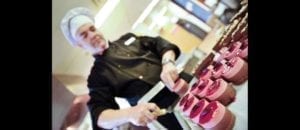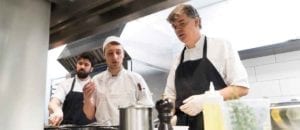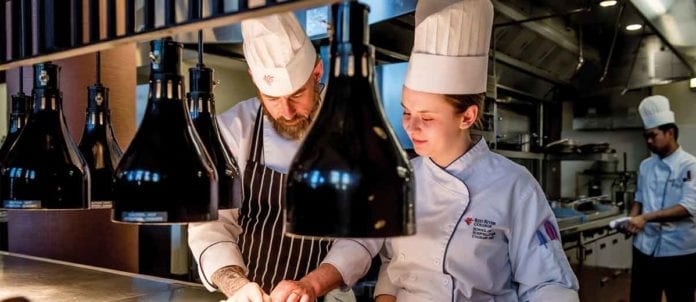Canada’s culinary landscape is changing and so are its culinary teaching institutions. “I’ve seen a lot over 30 years and I think we are now providing the best culinary education we’ve ever had in this country,” says Bruce McAdams, assistant professor with the School of Hospitality, Food and Tourism Management at the University of Guelph. “We really have improved the quality of our education and are responding better to the needs of the industry.”
While there have historically been only a handful of institutions in this country offering professional culinary training courses and turning out qualified professionals, “Now, we have great [culinary] colleges across the country. They are providing the industry with well-trained, qualified cooks,” says McAdams.
A major trend McAdams is seeing is the diversification of schools’ curriculums. Today’s students learn not only the basics of French and English cooking, but many have access to pâtisserie programs, sommelier courses and training in a wider range of international styles and world cuisines.
McAdams says restaurants also want chefs and bakers who know how to manage a kitchen. “Ten years ago, there were no culinary schools offering leadership training,” McAdams adds. “They were just putting students through cooking classes. Now, they are teaching courses in leadership . . . Today, being a chef is about being able to manage a team. I would say that it is as important as being able to cook good food.”
The following are some of Canada’s top culinary education institutions.
 Red River College, Winnipeg
Red River College, Winnipeg
Red River College’s two-year Hospitality and Culinary Arts program is designed to help students develop the fundamental skills and knowledge needed to work a fast-paced kitchen. The courses are set up to be a combination of theory and intensive lab-based practice. In the second year, students undergo more intensive lab-based courses and spend approximately 300 hours in culinary labs. “We assume all of the students who are coming into the course are coming in with zero culinary experience,” says Michael Fitzhenry, program coordinator and culinary instructor. “We take two intakes of about 40 students each year, start them off with basic kitchen principles and then separate them into two groups — cold kitchen or pâtisserie. The pâtisserie is an introduction to baking techniques and we created that course because we are seeing more demand for those skills in the industry today.” By the second year, students will also work in one of three student-run food outlets: a lunch outlet offering a globally influenced cuisine in a Marché-style; a short-order outlet that prepares daily breakfasts and hot sandwiches; and Jane’s — a 60-seat full-service lunch and dinner restaurant. A key feature of the Red River program is a strong emphasis on the business side of operating a kitchen, helping future chefs understand what goes into creating and maintaining a profitable kitchen/restaurant. This includes the fundamentals of cost control, learning how to calculate daily food-and-beverage costs, systems needed to maintain profitability, and how to establish dining room controls. Famous graduates include Gordon Bailey, who opened Lot 30 in P.E.I. in 2008 with his wife Traci. He recently returned to Winnipeg to teach a new generation of students at the college. Another is Eric Lee, executive chef at The Merchant Kitchen in Winnipeg. Like Bailey, he is now teaching at the school.
 Yukon College, Culinary Arts & Foodservices, Whitehorse, Yukon
Yukon College, Culinary Arts & Foodservices, Whitehorse, Yukon
The eight-month Culinary Arts program provides students with training in everything from the preparation of stocks and sauces, baking and desserts, to kitchen management. “Each fall, 16 students are accepted into the program,” says Ryan Cumming, Culinary Arts instructor, Culinary Arts & Foodservices. “After an intensive block of theory covering the basics of safety, sanitation, organization and cooking methods, students are placed into groups of four where they rotate through a variety of stations which expose them to different ingredients, cooking methods and techniques. Students begin to cook for the general public in a commercial-kitchen setting just a few short weeks after the program begins.”
Yukon College culinary students serve food in the College’s Kinnikinnick Kaff and the 40-seat Hilltop Bistro. “They also have opportunities throughout the school year to take part in catering functions of various sizes and scales, giving them a chance to experience different facets of the industry,” Cumming adds. Recently, the program catered a banquet for Yukon Agriculture utilizing as many local products as possible. “The abundance of locally sourced ingredients available during this time was eye-opening for students and staff alike. Students also cater Yukon College’s annual holiday party in December.”
Cumming says graduates of the program find their way into various positions throughout the industry, with most students heading to work soon after completing their coursework. “Some choose to continue on as apprentices and achieve the goal of Red-Seal certification. Others have embraced their entrepreneurial spirit and started catering businesses or opened food trucks.”
 Canadian Food and Wine Institute at Niagara College, Niagara-on-the-Lake, Ont.
Canadian Food and Wine Institute at Niagara College, Niagara-on-the-Lake, Ont.
With more than 700 students, the 40-year-old Canadian Food and Wine Institute at Niagara College offers a variety of programs covering beer, wine and culinary innovation. Programs include Artisan Distilling and a Wine Business Management course.
The school boasts a 40-acre vineyard, three-acre hop yard, 30 beehives, tender-fruit orchard, greenhouse and vegetable gardens to provide product for the courses.
“We have a staff of professors that are some of the most unique in the world,” says Craig Youdale, dean, Canadian Food and Wine Institute. “Our focus is on hands-on training with our eight culinary labs, sensory rooms, chocolate sugar room, teaching restaurants, catering services, teaching winery and brewery and food-sciences labs. We recently added more than 15,000 sq. ft. to our facility with three new kitchens and two new sensory rooms, including a butchery/charcuterie lab, as well as a new bake shop.”
The school also offers a one-year certificate program in baking and pastry arts and culinary skills, where students learn to apply advanced food theories to all aspects of food preparation.
A 14-week Baker Apprenticeship program is also offered, where apprentices complete 700 hours of college instruction and approximately three years of on-the-job training as paid trainees. Those who complete the Basic and Advanced Baker are eligible to pursue the advanced designation of Pâtissier through Niagara College. A similar cook-apprenticeship program is also offered and students will learn such key skills as professional baking fundamentals, culinary techniques, practical cooking and garde manger and modern pastry craft.
 Pacific Institute of Culinary Arts, Vancouver
Pacific Institute of Culinary Arts, Vancouver
Founded in 1997, Vancouver’s Pacific Institute of Culinary Arts is an intensive program designed to provide students the skills needed for working in modern kitchens. Students are expected to attend class for a minimum of seven hours per day, five days a week. All students start at the same level of instruction; classes are built around learning kitchen basics and then building on those skills with daily lab work.
Students have three programs from which to choose: a one-year, full-time Culinary and Baking & Pastry Arts diploma program; a six-month Baking and Pastry Arts Diploma Program; and a six-month Culinary Arts program.
“Our class sizes are small, with [only] 15 students in each of our eight kitchens, and each kitchen has a dedicated instructor,” says Julian Bond, executive chef and vice-president of the Pacific Institute of Culinary Arts. “Our focus is building on the basics and repeating those skills until you really learn them. It is about repetition and the honing of your skills. Many schools will teach you how to bake a cake, for example. But what is the point of a culinary school if you make a cake just once? Here you will learn to do that so that you can bake that cake for a restaurant setting without having to look at a recipe.”
Some illustrious alumni who have come out of the program include Eric Hendry of Bar Von Der Fels in Calgary, Alta., and Thao Nguyen who works as the pastry chef at the Little Chief Restaurant in the Grey Eagle Resort Hotel in Calgary, Alta.
 George Brown School of Hospitality and Culinary Arts, Toronto
George Brown School of Hospitality and Culinary Arts, Toronto
According to Christine Walker, chair, Chef’s School, Centre for Hospitality and Culinary Arts at George Brown College, there are a variety of programs at basic, intermediate and advanced levels available to prepare students to become qualified chefs, bakers and pastry makers.
Students can enroll in apprentice, certificate, diploma and post-diploma programs, as well as a post-diploma Italian Culinary Arts program built around a three-month placement in Italy at the Institute of Advanced Culinary Arts. Students also get a chance to develop their skills further at The Chefs’ House — a student-focused concept restaurant in downtown Toronto.
While many culinary schools offer a baking and pâtisserie program, George Brown boasts an Advanced French Pâtisserie Post-graduate program. “Advanced pâtisserie is very much sought after now by the industry,” Walkers adds. “The program offers an opportunity to live in France for four months — in school for one of those months, five days a week, and then eight weeks working across France and learning about high-end pastries and bread baking.” The program is run in partnership with Ecole Nationale Supérieure de la Pâtisserie (ENSP) and the Ducasse School in France.
Among the famous alumni is Jamie Kennedy, who graduated from the Cook Apprenticeship program at George Brown in 1977.
 Centennial College’s School of Hospitality, Tourism and Culinary Arts, Toronto
Centennial College’s School of Hospitality, Tourism and Culinary Arts, Toronto
Centennial College’s School of Hospitality, Tourism and Culinary Artsrecently unveiled a new Culinary Arts Centre — a modern high-tech learning centre boasting several contemporary kitchen labs, and a beverage lab and bake lab. Students also showcase what they have learned at the school’s full-service The Local Cafe and Restaurant, as well as the Centennial College Event Centre.
Approximately 300 students enroll each year in the culinary and baking arts and management programs. The goal is to give students not just the strong practical skills for cooking and baking demanded by the industry, but to instill in them the skills to manage a kitchen and restaurant.
The one-year Culinary Skills program emphasizes seasonal cooking using locally source ingredients. Students can also take a second year where they will learn management skills for operating a kitchen, restaurant or catering operation. The one-year Baking and Pastry Arts Skills program teaches the fundamentals of baking and pastry preparation, and a second-year management program focuses on the skills needed to operate a baking operation in a restaurant or as a standalone business.
Joe Baker, dean at the School of Hospitality, Tourism and Culinary Arts, says the focus for the students is on what he calls experiential learning. “Our students will get hands-on experience right away,” he adds. “The Local Café and Restaurant and the Centennial College Event Centre, give our students the chance to work in quick-service, full-service and event/catering environments. It is not about taking theoretical courses — our students are serving and working with the public as early as the first week.”
Suzanne Caskie, chair of Culinary Arts says the management component is an attractive feature. “We all know when you start out you will have an entry-level position, but for you to really be career ready, you need to have more than just the ‘hard skills’.” Instructors include chef Rene Chauvin, former executive chef at The Distillery Restaurant Group Inc., and chef Sally Chiu-Hildebrandt.
Humber College School of Hospitality, Recreation and Tourism Toronto
Humber College’s baking and culinary programs have been teaching future chefs an extensive range of cooking, baking and management skills since 1982. Rudi Fishbacher, assistant dean with the Schools of Hospitality, Recreation and Tourism, says students entering the program will spend half of their classroom time in the school’s kitchens and pastry labs perfecting their skills.
The school has seven fully equipped kitchens and three pastry labs. Students can enroll in a Baking and Pastry Arts Management diploma program focusing on traditional and contemporary techniques, as well as international trends. The Cook (Cuisine) Apprenticeship certificate program provides the fundamentals of menu planning, costing, butchery, garde manger and charcuterie, nutrition, baking, purchasing and product management. The Culinary Skills certificate program is designed to provide theoretical and practical skills, while learning in labs and real-world settings with the latest kitchen technology and equipment.
As part of a student’s training, they will also work in the 120-seat Humber Room — an on-campus, upscale-casual restaurant open to the public for lunch and dinner. The school’s retail store also sells products prepared by students in the baking and pastry arts/culinary programs.
“Our goal is to give our graduates a solid foundation on which to build their careers,” says Fishbacher. “We are one of the few colleges today that still do, and insist on, a full-butchery component as part of our program. Our students learn how to break down a whole lamb, how to make certain cuts of meat and know what a good cut is.”
 Stratford Chefs School, Stratford, Ont.
Stratford Chefs School, Stratford, Ont.
The Stratford Chefs School was founded in 1983 by James Morris (Rundles), Joseph Mandel (The Church Restaurant) and Eleanor Kane (The Old Prune) as a private, non-profit institution operating out of the kitchens of Rundles and the Old Prune. This year, the school moved to a new facility to accommodate the 70 students who attend its two-year program each year.
Randi Rudner, program manager with the Stratford Chefs School, says the school’s focus is on training in all aspects of owning and operating a small restaurant, and is staffed by restaurant professionals who are currently working in successful restaurants throughout North America.
“Those graduates who decide not to pursue careers in the kitchen have gone on to a wide variety of endeavours in the food and hospitality industry,” says Rudner. “Our alumni are educators, sommeliers, photographers, recipe testers, butchers, food-safety inspectors, television and media personalities, fishmongers, restaurant designers, cheesemakers and maitre d’hotels.”
The two-year program is broken down into two levels in which students learn the fundamentals of classical and modern practical cookery and pastry — as well as front-of-house service — including food history, food costing, culinary management, sanitation, nutrition, communications, wine and writing.
“In the eight months between [the two levels], the students are expected to work in restaurants to further develop their skill,” adds Rudner.
Rudner says the school also offers students the chance to learn from and work next to many internationally recognized chefs, including Jean-Georges Vongerichten, Theo Randall of Mayfair Restaurant and Jacques Chibois, of La Bastide Saint Antoine. Well-known Stratford Chefs School alumni include James Walt, executive chef at Araxi Restaurant in Whistler, B.C. and Chris McDonald, who was chef at Cava in Toronto. FH


















